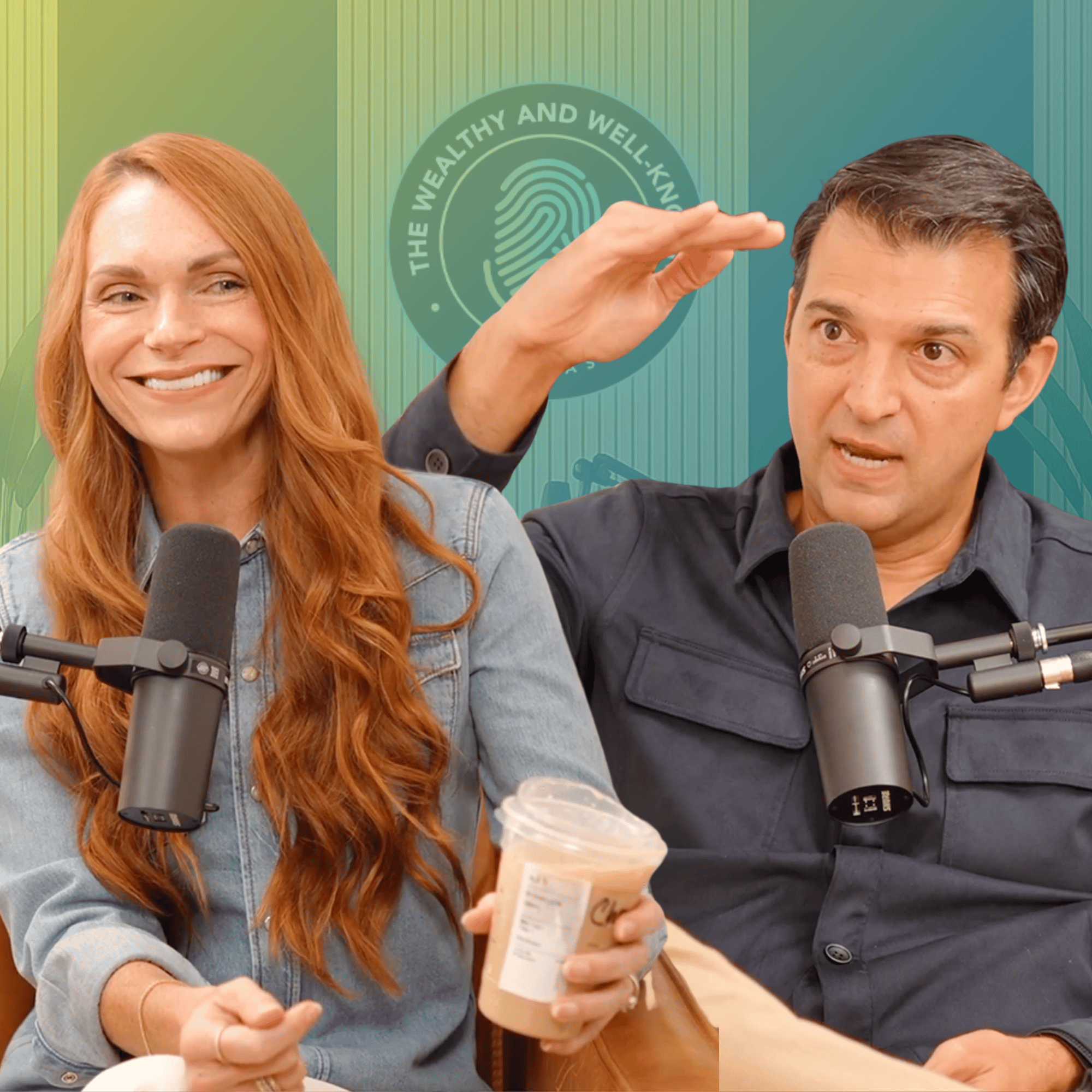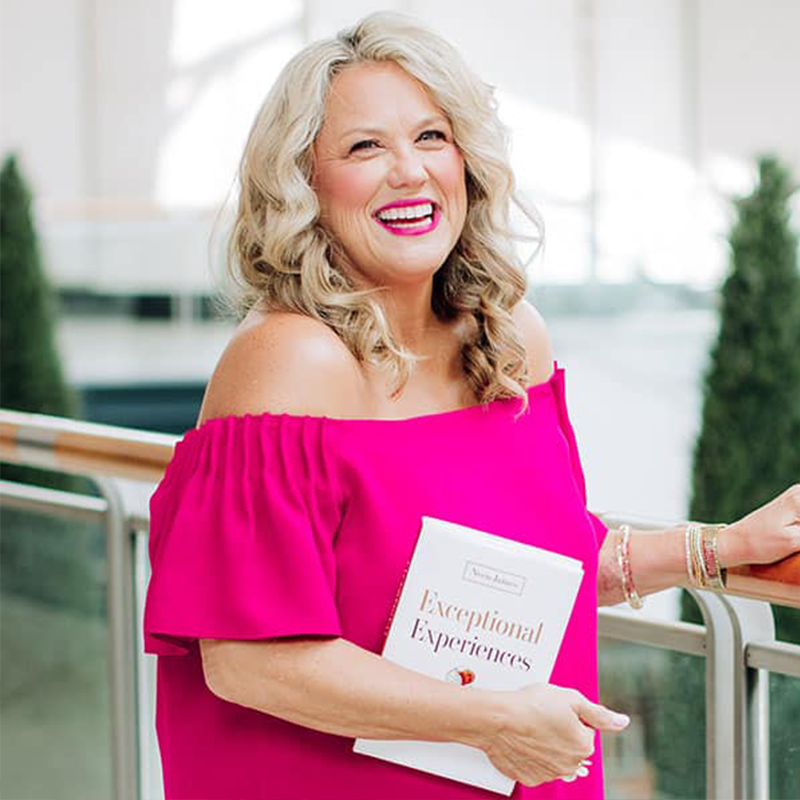RV: (00:06)
Hey brand builder, Rory Vaden here. Thank you so much for tuning in to listen to this interview. We are so excited to bring you this information and wanted to let you know that, Hey, there’s no sales pitch coming from anything that we do with this is all our value add to you and the community. However, if you are somebody who is looking for specific strategies on how to build and monetize your personal brand, we would love to talk to you and we offer a free call to everyone that’s interested in getting to know us and is willing to give us a chance to get to know them and share a little bit about what we do. So if you’re interested in taking us up on a free strategy call, you can do that at brand builders, group.com/summit. Call brand builders, group.com/summit. Call, hope to talk to you soon on with the show
RV: (01:03)
You are about to meet someone. My friend, John Jantsch, who has a reputation for being one of the most practical marketing strategists in the world for small business owners. He and I actually met years ago. We shared the stage at an amazing event called social media marketing world, which we love our, our very close mutual friend, Jay Baer introduced us. And then over the years, we’ve just kind of known of each other. And John is the author of several books. I mean, duct tape marketing, I guess you would say has maybe his flagship book, duct tape marketing is been you know, it’s, it’s become a kind of like a main ubiquitous term in the marketing world, which we’ll talk a little bit about. And he also has an agency they do done for you work. They work with companies, you know, all over the place he’s been featured in all types of major media spoken at large events. You know, he’s spoken for Ted and he’s just a really amazing guy. And he also has one of the, the biggest marketing podcasts in, in the universe of iTunes. And so we connected recently at a an author mastermind group that joined up and I thought, ah, you gotta, you gotta meet John if you don’t know him. So welcome. Welcome to the show, my friend,
JJ: (02:27)
Hey, thanks for having me. And I’ll give my first personal branding tip you. You introduced me as one of the world’s most practical, small business marketing experts. That was actually a line I made up and started saying and saying, and saying, now obviously, you know, you kind of have to deliver on that. But you know, it was sort of a self-proclaimed title that, that overtime I sort of made happen, but that’s my first branding tip.
RV: (02:51)
I mean, I, I love that cause I think you know, do you know Sally Hogshead? Oh, sure. Yeah. Yeah. So Sally is amazing and you know, everyone’s always like try to be outside the box, outside the box, but you know, she taught me this lesson when you’re, when you’re trying to market your business, you actually want to put yourself inside a box, something that people can clearly define as like your, the person on this. And most of that, especially when you first start, you just make it up and then, and then it becomes real
JJ: (03:20)
Well again, I think you have to deliver on it, but, you know, you’re the one who gets to at least frame it and, and define it. I mean, it, you know, whether it’s true or not, it will be told by, you know, how the market perceives it. But, but, but framing it, defining it, you know, one of the things I think that’s, that’s beautiful about doing that too, is that, you know, a lot of people have come and gone with this platform or that platform and, and, you know, being like, Oh, I’m going to be the early mover on that. I think when you have a, a point of view, you know, about, here’s what I believe, you know, sometimes some of that stuff becomes, you know, not, not that relevant. I mean, conforms come and go. You know, for example, you know, I’ve basically, I’ve said marketing as a system and that you know, it starts with strategy before tactics. And I have, that’s been my mantra for 25 years now. And frankly, you know, it’s, it’s independent of any of the platforms coming and going because that’s, I believe that that that will never change when it comes to working with and consulting with small businesses.
RV: (04:25)
Totally. And so can you take us, can you take us to the, I know this is like kind of the original work, but duct tape marketing, can you just like tell us what the premise is and like what that’s, what that’s all about? Cause I think it’s super relevant.
JJ: (04:40)
Well, well, so I’ll just give you an, I can do this pretty quickly, but the whole backstory, you know, I started my own marketing consulting firm about 30 years ago. I right out of college, worked for a, an ad agency for about five years and said, you know, any dummy can do this. I’ll launch my own.
RV: (04:56)
However, the entrepreneurs, any idiot can do this on their own.
JJ: (05:01)
I had no plan, you know, I, I knew I could hustle work. And so I got projects, you know, big companies, big projects, little companies, little projects, and took whatever came along. And at some point I realized I really like working with small business owners and they just, you know, you’re working with the person, you know, not necessarily a department or a company. And I just really love that, but they’re also really frustrating because, you know, I’d had kind of agency training and I was like, well, this is how you do it. And you know, they don’t have the same budgets or attention spans or anything. And so one day I just said, look, I’m going to create a way where I can walk into somebody and say, here’s what I’m going to do. Here’s what you’re going to do here are the results we hope to get by the way, here’s what it costs you want it.
JJ: (05:44)
And, you know, after the first three people said, like, where have you been? You know, I realized that in trying to solve my frustration, I was actually tapping into what is still today. One of the greatest frustrations for entrepreneurs and owners, it’s very hard to buy marketing services because everybody’s selling someone a piece of it or, you know, this idea of the week or that idea of the weekend. And so they just kind of lose control of it. And so the fact that somebody was kind of bringing up a package called marketing, you know, made it, made a ton of sense because I was sort of productizing, if you will a service of marketing, I thought it had to have a name. It had to have a brand and, you know, John’s consulting service didn’t really cut it. And so I just on a whim, quite frankly, just started calling it duct tape marketing.
JJ: (06:32)
And, and it was, it was because of my years of working with small business owners it kind of was this idea of look, you know, you’re making it happen, you’re making it up every day. Some days it feels like, you know, it doesn’t have to be always have to be perfect. It doesn’t always have to be pretty, it just has to work. And I think a lot of people kind of associate that sort of practical idea, you know, with, with the, the actual tool of duct tape. So that was the metaphor that I was really, really trying to play off of. And it, and it just, you know, for a lot, I mean, there’s a strange affection in the U S at least maybe in Canada, too, with, with duct tape. So it kind of played on that sort of fondness that some people have even jokingly, but also really kind of hit home with the sort of practical nature of let’s just get this thing to work.
RV: (07:18)
Yeah. That’s why I love that. It also has kind of the like double entendre, if you will, of, of, of stickiness, which is like what you want your marketing to be, but you know, when you say it just has to work, I think there is like this myth, you know, cause we’ve been, we’ve been small business owners several times. We’ve been startups several times that it’s like, you think that, Oh, there’s there’s these, these, these large companies, or, you know, let’s say like a multi seven figure and eight figure company that, gosh, they just have all these beautiful marketing systems figured out and dialed in and it’s like, they fricking down, it’s a mess. I mean, we interviewed Amanda tress. Not that she’s not a mess at all, but, but she admitted, she’s got a $50 million business and she’s running on spreadsheets. Like it’s, it’s crazy of, of going. It doesn’t have to be pretty. It just has to work. So I, I love that. And I think that’s you know, that is duct tape, right? Just, just duct tape.
JJ: (08:18)
Right. And I’m not necessarily saying that’s the best way. I’m just tapping into reality that, that just, as you mentioned, that just is the reality of how so many people do it. I mean, I, there are definitely more beautiful ways in which to build a business. If you’ve got everything figured out, if you’ve got the funding, if you’ve got the, you know, the patients, if you’re not stressed out, you know, there’s a lot of beautiful ways to build a business. But what I was trying to tap into was the fact that people were saying, yeah, that, that is what we’re doing. Can we, can we actually take that and turn it into a system? So
RV: (08:52)
Relating this to personal brands, cause I know you work all different types of small businesses. But you know, you, you are an example of like, you know, the, the kind of people we serve, authors, speakers, consultants the, I feel like we have a lot, I’m gonna take advantage of a free coaching call here. Cause a lot of our members, what we’ve they’ve been doing is they’ve been building their product. Right. So they’re in that stage where it’s like, okay, they’ve been wrestling with building their product, whether it’s a physical product or it’s a video course or a coaching program or whatever. And then one day they go, Oh, I’m done building it. Now I actually have to do something to tell people that it’s here. And when you, can you talk a little bit about both the mindset and then also maybe some of the tactics, you know, tactical advice that you would give to somebody in that moment. It’s like, okay, I now have my widget. What’s the first thing I should go do to like create my first customer or my first lead from, from marketing. Wow.
JJ: (09:58)
So, so I will botch this, but there is a a Chinese proverb that goes something like when’s the best time to plant a tree. And the answer is 20 years ago. You know, but if you didn’t do it, then today is the best time to plan it. So, so my point in that is that, you know, and I know that a lot of things have changed in the world, you know, in the last 20 years. But you know, I started building a following before I had any idea what I was going to sell to them. You know, I started talking to people, I started educating, I loved sharing my ideas. I mean, I had clients. And so I talked about what might, what worked for my clients. But that’s, you know, that’s the first bit of advice, which doesn’t really answer your question, but I mean, that’s the first bit, you know, don’t, don’t wait until you have a perfect product, you know, go out and start talking to people, go out, go out and start seeing if it resonates, go out and get their advice.
JJ: (10:50)
I know some of the first couple of courses I’d built with potential customers you know, I said, Hey, come on in here. Here’s what I’m thinking. Oh, that doesn’t work for you. Okay. What if we did this? You know, and then it was like, okay, here’s round two. I mean, so, so start doing it with people as opposed. I mean, I, I, I know I had a couple products that I D you know, I sat in a room and launched. I said, Oh, no, the world needs us. You know? And then it was like, press go. And like, nothing, you know, nobody wanted it, it didn’t make sense. You know, it was, it was the wrong price. It was all those things. So so you know, that to me is, is what you have to do is you have to actually just go start talking to people. I mean, even if you’re not done, you know, here’s what it’s going to be. You know, here’s what it’s going to look like. Here’s what the problem is solves. Y you know that again, still, probably haven’t answered your question directly, but I mean,
RV: (11:44)
But I think it’s important cause it’s like a prelaunch, right. Is to go build, build the audience before you build the product. Like, that’s, that’s a great thing. It sounds like the way you built the audience was basically like, just teaching and talking about what you were interested in and asking questions and like sharing what, you know, and then people started following and then it was like, they were basically, they were there when you were ready to launch something. Yeah.
JJ: (12:09)
Th that’s right. But, but I think also you know, you get kind of, I mean, people talk about beta users. I mean, early adopters. I mean, you get people that actually help you improve it, what it is that you’re building. And that’s the part that I love. And then those people generally speaking, become evangelists to not just, not just buyers. There was a practice right when ad-words maybe kind of came around. And so this is, this is probably 20 years ago and I don’t think it’s taught anymore. But I think it’s, it’s instructional. You know, w when you could buy clicks back in the good old days for about 10 cents you know, on some things, a lot of marketers would actually put up landing pages and advertise products and courses and eBooks and all kinds of stuff that didn’t exist.
JJ: (12:59)
And then literally would you would, you know, take some of those early opt-ins and early buyers and, and create a product with, you know, they found out which one was the most popular. Again, probably shady, probably a bit unethical certainly not affordable today, you know, because of the, the, the online space has changed so much. But I think it’s instructional in that, that, you know, when I, when I start thinking of an idea, I start writing about it as though it is not like I have this course, but here’s the premise behind this idea, you know, here’s the problem I’m trying to solve. Here’s what I think is broken. And you start immediately getting feedback from people about, you know, not only is that a good idea or bad idea, but maybe, you know, how how to, to actually go about solving. Yeah.
RV: (13:48)
I, I hear that. You kind of saying that that’s kind of similar to what you did. You weren’t like launching landing pages for collecting money, for things that didn’t exist, but you were doing that early adaptive, like come in here, be a beta user and then test it out.
JJ: (14:04)
You and I have a mutual friend, Mike McCollough, which that I think just has done something brilliantly over the years, he gets an idea for a book. And in his mind, his product really is, is booked. He gets an idea for it, and he just starts talking about it get some group of people interested in the idea. And then he just holds a two day workshop and they actually come and they build, you know, how this idea would work, which ultimately turns into his book, which then ultimately turns into a course which ultimately then turns into a consulting or coaching licensing program. And he’s, he’s replicated that model about five times now, you know, and, and his, you know, what he’s personally selling is, is the book itself. And, you know, he’s selling hundreds of thousands of copies of books now using kind of proven method of, of actually having before he even writes one word, or maybe before he even pitches it to a publisher, he’s got a really good book written or, or outline created. And even some case studies, maybe a four for the book, which then again, his books exploded other things. But I think that’s a, I think it was a really informative model.
RV: (15:14)
Yeah. So, so let’s say you now, so let’s say you do that. Is there anything that you go, whether it’s a book or a course or whatever, I think that there’s this fear, you know, for every entrepreneur is going, Oh, crap. Like, what do I do? Cause there’s so many, like you said, there’s so many platforms, right? So it’s like, well, should I start a podcast? Should I do Google ads? Should I buy Facebook ads? Should I have a Facebook group? Should I send emails? Should I go knock on doors? Should I like, like, how do you navigate that list of a bazillion things you could do to figure out what you should do?
JJ: (15:49)
Sure. you know, it’s, it’s, it’s, you know, if you’ve built a product and now you’re facing, like I’m not going to eat unless I sell some of this you know, go out. I mean, to me, the easiest thing is go out and find people who already have a list who already have a following and figure out a way to add value to their community. I mean, that’s the fastest way. You know, if I came to you or you’ve got a community and I came to you and I said, Hey, I’ve got this thing that would be great for your community. You know, we can, you know, we can revenue share or I’ll give it away or whatever it is. You know, that’s, that’s the fastest way to start building some things and
RV: (16:28)
Find an audience that’s that has that already exists. That has an appetite for what you’re offering.
JJ: (16:34)
Yeah. I mean, that’s the fastest way. You know, it doesn’t necessarily mean that everybody, you know, you go, Oh, I’m going to go talk to this person who I know has 2 million followers, and they’re going to put, you know, obviously it’s a relationship building. It’s, you know, I’ve got to have something of value for that person. It’s not just about the money. You know, it’s about serving their community. Hopefully. So, I mean, that’s the fastest way, but, but ultimately, you know what I believe still today, even though a lot of people talk about Facebook and communities and groups and all that stuff, focus on building the list, the email list is pretty much going to be everything for you. So if you’re going to be on Facebook, if you’re going to have a podcast, you know, if you’re going to be doing videos on YouTube, somehow connect those back to a reason why somebody would give you their email address because that’s you know, I’m not saying that just build an email list and it’s like minting money, you know, but that’s how you build the community, the long-term connection to the community that you own.
RV: (17:40)
Yeah. Well, I, I think that, I love this idea of, of the F the first, so the email lists certainly it’s like always really good reminder also though. I do think people were so consumed with the idea of building a following, which, you know, I don’t know for you, but for me every time we’ve done it, and we’ve now done it three times from scratch, it’s been slow and painful and hard, and it takes a long time and you it’s like, what else are you going to do? You got to do it. But there, if there is a shortcut it’s going, who has this? Who has my audience already? And what can I do for that community and that person to get in front of them? I mean, that’s, that is so profound. I think it’s, it’s simple, but it’s easy to overlook that, that this, your audience exists somewhere already.
JJ: (18:34)
Well, it doesn’t just have to be, cause a lot of times it’d be people immediately think of, you know, who are the A-listers, you know, that everybody knows and they want to go to those folks, but there are all these companies out there. You know, I started my, my first big sort of success in that realm of kind of partnering. And again, this was early on and you know, we’re not everybody was producing all kinds of educational content, but I produced a, an ebook for a software company. Well, I, they didn’t know I produced it for them, but I produced it. It reached out to them and said, Hey, all of your customers are small business owners. They’re all trying to learn how to market. If they’re better marketers, they’re going to buy more of your software. And so what if we did this thing where we co-branded this ebook and I probably got 30,000 subscribers, you know, over a five-year period from that relationship, you know, there are lots and lots of people that need you know, what you have to say and have an audience that, that, that if you can make it right for them, make it valuable for them.
JJ: (19:34)
Then, you know, you’ll be invited in, you know, as a friend and effectively, I mean, I did thousands, tens of thousands of dollars of business with those people that they’re resellers, you know, because I was shown, you know, seen as this expert. And, and it just, you know, it really launched a lot of ways that it really launched the commercial side of duct tape marketing from a consulting side.
RV: (19:58)
See, I love that because, because everyone goes, yeah, I want Tony Robbins to send an email blast for me. Well, okay. It might like, it might take a minute right for that to happen, but these companies or the other one would be like associations, right? Associations are desperate for content and training for their members. And if you can show up and do a free training, now it’s like their email list became your email list. And then, and it actually could become that way if you capture those, those emails. I mean that’s, and when you do it with a company they’re not trying to sell the same thing you are, there’s just trying to serve the same people.
JJ: (20:39)
That’s right. And in a lot of ways, the way they’re going to look at it is, Hey, this is, this is work. We don’t have to do, it’s a value add for our customers, you know, whereas the other influencers, like I got only so many times I can send to my list. Right. And so, so the, so the, the calculus for them is, you know, it’s going to be much more what’s in it for me that whereas the company is going to be much more theoretically, you know, is this is, well, it’s still going to be what’s in it for me. But, but the, the math is different. What’s in it for me is I don’t have to do it now. And my
RV: (21:16)
Trying to get at the same thing, they’re both going for different things. Yeah. And I, I think I mean, that’s a, that’s a, that’s amazing. Every, every company has a database of customers and you might have a zero email lists, but you go, somebody is servicing small businesses. Someone is servicing, you know, single moms, someone is servicing, you know, gym owners in some way. And, you know, you just figure out who you get in front of. So I really love, I really love that if like, if there is a shortcut, you know, that, that would be, that would be it. Yeah.
JJ: (21:51)
Yeah. Everybody’s starting a business. Should, that should be their first marketing. I mean, they’ve got to build all the other stuff, but that’s the, that’s the jumpstart.
RV: (22:00)
So what about paid? Can we talk about, well, actually, before we get to paid, let’s talk SEO because you actually have a book on, on this you know, you know, something about SEO. And I, I, what do you think small business owners need to know about SEO? Because it’s kind of like this, Oh, this Ninja tactic, like high-level tech thing, but you know, there’s a lot of simplicity to it too, you know? And I, I thought it was interesting when I found out you had written a book on SEO because I was like, gosh, you know, I, in my mind, I almost think of it as like a big business strategy. And, and yet, you know, you obviously see the, the application for first, for super small businesses.
JJ: (22:48)
Well, absolutely. I mean, if you think about the services that you buy or, you know, you travel a lot back when people used to do that the you know, you’d come into a town, it’s like, eh, I want to find a restaurant and I want to get my hair cut. I want to, you know, whatever. I mean, we turned to a search, right. For that. And, you know, because you’re holding the phone you know, Google says, Oh, you’re in that town. And that’s 3.4 miles. You can find this thing. Well, that’s all SEO. I mean, that’s your, if, if, if local businesses aren’t showing up in the maps pack or, you know, the, the various ways that they show up in search, I mean, they, they don’t exist in a lot of cases. So it is certainly you know, a big business strategy.
JJ: (23:30)
It’s an every business strategy just because of the buying behavior. You know, today we all, I, I, I would guess that, that, you know, 90% of, of purchases today start with some form of search. I mean, if, if somebody came to you and said, you need to, you need to hire this duct tape marketing company. I mean, they’re, they’re amazing, you know, you’re, you’re, you’re certainly gonna turn online. You’re not gonna pick up a phone and call me. I mean, you’re going to do a search and maybe if you’re trying to figure out if I’m, you know, if I’m legit or not, you’re going to deeply search and see what other people are saying and stuff. So any rate SEO is, is hyper hyper important for every business, probably more important for smaller businesses who don’t have, you know, budgets to, to blast over the airwaves.
RV: (24:16)
So when you talk, when you talk about the budget, so what do I need to do as a small business owner? Right? Like, I don’t have a bunch of money to do paid, like, what do I actually need to do when it comes to SEO?
JJ: (24:27)
So truthfully SEO is a long-term game. And a lot of people don’t want to tell you that a lot of people want to tell you, Oh, no, you just, you hire us to SEO this stuff. Well, what you have to realize is that as is that search engine optimization is a strategic combination of your website, your structure of your website, your content, and then some technical factors. It’s not like black magic. If you don’t have great content, if your website’s not set up the right way, you know, for that content to be structured and displayed. And then there’s some little off, you know, are there other signals out there in the world of other people saying your content is great? I mean, that’s, you know, that’s really the part that people miss. I mean, it, it begins and ends with good, relevant, useful content.
JJ: (25:13)
That’s structured in the right way. I can’t, if you hired me and you don’t have much content, or it’s a bunch of crap, I can’t help you from an SEO standpoint. And that’s the part that I think a lot of people misunderstand that the, the optimization part is to take good, useful content. That’s structured in a way that that makes sense to Google and to, to, to send more signals. That’s the optimized part. So there are on page things that you can do in terms of internal linking, you know, amount of keyword structure, those things goofy thing called structured data. And it a goofy thing called metadata, which we will get into, but it’s all pretty simple stuff. And it’s gotten simpler because Hey, people have written plugins that make all that stuff, you know, happen for you. So all of the on-page stuff is just a matter of paying attention.
JJ: (26:02)
And then there’s clearly some off foot what people call off page signals. And those are just do other people like you or other people linking to your content? Do you get mentioned in social media or does your content get mentioned in social media and shared and circulated? I mean, those, you know, that when it really comes down to it, it’s great content on your site. It’s it’s then, you know, content that’s linking back to your content on other people’s sites. I mean, that’s really it. And, and if you, but it, to me, it all begins and ends with a content that is useful, you know, based on what people are searching for.
RV: (26:39)
You mentioned something weird on the ongoing, back to the, you said there’s something weird called data, what structured data, what is structured data?
JJ: (26:49)
It’s just it’s just some HTML code that tells Google very specifically, what something is. This is a book, this is a person, you know, this is an address. This is a local business. This is a blog post. You know, this is a list of products. This is a list of reviews. I mean, so it’s a whole set of different types of data that that, that if you add, you know, the HTML code to the data that’s, that’s under the hood, you know, in your website structure it, it gives, it’s just another very potent round of information for Google.
RV: (27:30)
So it’s, it’s kind of similar to metadata. Although metadata can be visible like INSEARCH, but it’s, it’s just, like you’re saying, it’s a signal back to Google saying, this is what, this, this is what lives here on this page.
JJ: (27:44)
Well, and maybe this is what this specific item is, you know? So, so a lot of times, like if you do a search real easy examples, you do a search for you know, movie, a movie theater you know, or, or, you know, best new movies in 2020. And, and, you know, you’ll see a list that is basically structured data. You know, here’s all the movies, here’s the movie times, here’s the price, here’s the theaters, you know, so it’s a table, you know, that’s presented in your search results. Well that, you know, that table is constructed, you know, using structured data to tell Google, this is what this stuff is, because, you know, there could be something like, you know, duct tape market. Is that a book? Is that a podcast? Is that a blog, you know, is that a company name? And so a lot of what it’s do, you’re using structured data to is to not let, not, not leave Google to guess, you know, what it is that, that thing is that it’s you know, you’re saying, no, I’m talking about the book.
RV: (28:47)
Interesting. I didn’t know that. So when you see like the little tables that pop up, it’s just basically directly populating stuff, right. Off of sites, based on what the structure data like input is.
JJ: (28:59)
That’s right. And, and we’ve had structured data for a long time. If you think about lists, you know, lists are basically structured data, you know, you see, but whether it’s a numbered list or an unordered list with bullet points, that’s, you know, that’s structured data and the concept of structured data, but now we’re basically just putting HTML code around all that stuff to say in the, this is a list of books. This is, you know, these, this is a list of authors.
RV: (29:26)
Interesting. So and so it’s like for each element, almost on a page, you could have some structured data. Cause cause you would have like your H one tags, H two tags, meta-tags your TA the page title, like the, like the URL, those are all things that would, are signals, but then that, this is interesting. I’ve never, I’ve never heard this before. Like
JJ: (29:53)
He’s gotten very deep in the weeds here, but the good news is, as I said, there are some
RV: (29:58)
Practical, small business marketing. Excellent.
JJ: (30:02)
That’s right. That’s right. But the good news, is there a WordPress plugins, if your sites on WordPress that you add to the site and essentially then every page you’ll have the ability to fill in elements that you want. So you’re not actually having to get in there and write the HTML code yourself. Yeah. so, and it’s, you know, for local businesses, I mean, it, it actually, it actually brings in not only the address, but the law latitude and longitude, you know, their business. I mean, so it’s a very, very specific signal to Google. Yeah. This is a local business.
RV: (30:35)
Wow. yeah, that is, that is awesome. Well, so there you go. I mean, there’s, there’s a lot to learn here and you see like, there’s, there’s the strategy and then there is the tactics, but well, thanks for this, John, and for this, this introduction I mean, super, super interesting and useful stuff. Where should people go if they want to connect with you or learn more about duct tape marketing and the stuff that you do?
JJ: (31:01)
So the easiest place is just a pretty much everything I’ve written for the last couple of decades. You could find that duct tape marketing.com and that’s D U C T T a P E marketing.com
RV: (31:15)
Duck tape like D U C K tape marketing.com.
JJ: (31:19)
Well, just plug it into, plug it into a search engine and see what happens, but I bought pretty much every variation of this spelling. And so it all, they all just redirect to, to, to
RV: (31:32)
Right spot. So you get a spelling lesson, you get a bonus spelling lesson as well as fast,
JJ: (31:38)
Because more and more than one more than one time, you know, when I’ve been out there speaking in the world and whatnot, and they’ll have in the program, you know, like not, it didn’t happen in social media marketing world, but, but it has happened before you know, where we’re appropriate. We’ll put John Jansen, D U C K T a P E marketing.
RV: (31:57)
Yeah. Well, I, you know, the D and the F are also right next to each other on the keyboard. So that could be a bad mix up.
JJ: (32:04)
Yeah, that’s right. Well, that’s right. Well, the the the the, the, the, the confusing part is there actually is a brand of duct tape. That is Fran. Yeah. So do, do you want to, do you want a history lesson on where the name duct tape marketing or not duct tape marketing, but duct tape came from, we probably don’t have time for that. We might have to do that on another one.
RV: (32:26)
I mean, if it could go for it, if you, if you think it’s relevant, it’s not relevant at all, but, well then definitely.
JJ: (32:34)
I mean, that’s what we’re really interested is the irrelevant stuff. So, so world war II the, the, you know, the army commissioned the company to make some, some tape that would help them repair the tops of those canvas Jeeps. I had to be waterproof, you know, I had to really stick. And so it was called something like GP 47, you know, fix it or something. And all the GIS just called it duct tape because of the, you know, it was, it was waterproof, you know, so they, they were talking about Duc K after world war II ended we started putting air conditioning in homes. And so that was, you know, all the venting and every other thing that ran through those homes. And some of these ingenious GI said, Hey, you know what? This stuff actually seals the seams in the gaps between the UCT ducks in their air condition. And so it officially became duct tape because it was used in that fashion. Nobody uses it for that anymore, but now it’s sort of universally loved as a, as a fix it for, for everything. So I don’t know if that was interesting or not
RV: (33:45)
Super interesting. I mean, that is like, what that is it? Yeah. You just won somebody a hundred thousand dollars on a future episode of jeopardy or something like, and, you know, you remember John Jansen on the influential, personal brand podcast, when you, you know, you send us a little referral fee when you get that quiz question. Right. that’s, that’s not, I had never heard that. And I have actually wondered that before, like where in the heck, like where in the heck does this name come from? Well, we’ll put a link there to duct tape marketing dot com John Jantz, which is pronounced like pants, but spelled a little bit different. But if you search duct tape marketing, you, you, you will find John. And obviously we’ll link up to him, all of the social profiles on our, on our blog and stuff. Well, John, thank you for being here and just for your, your consistent commitment to marketing principles that have lasted, you know, outlasted all sorts of different platforms, you know, over, over a couple of decades. And you know, certainly your personal brand has stood the test of time, which is a, a great Testament. And we’re so glad to have you

















